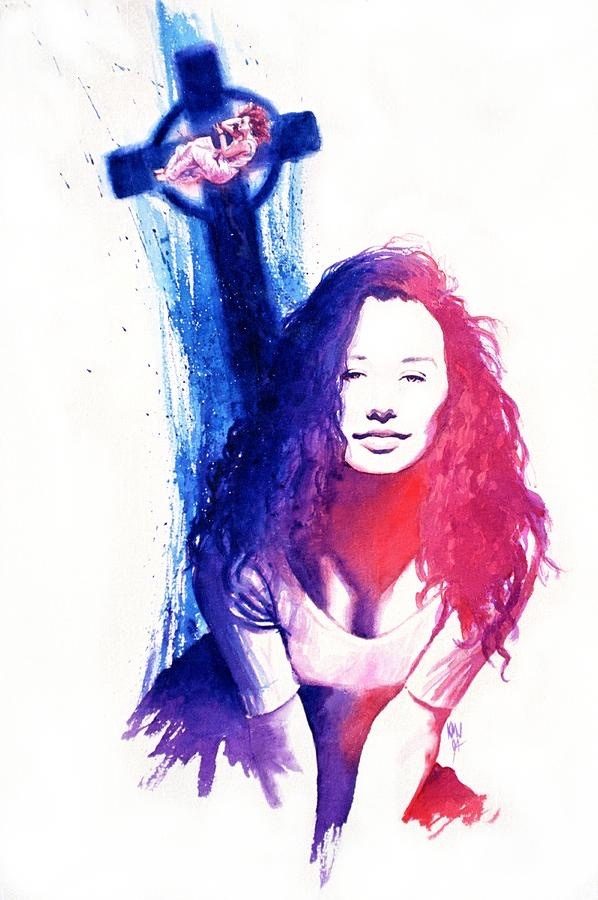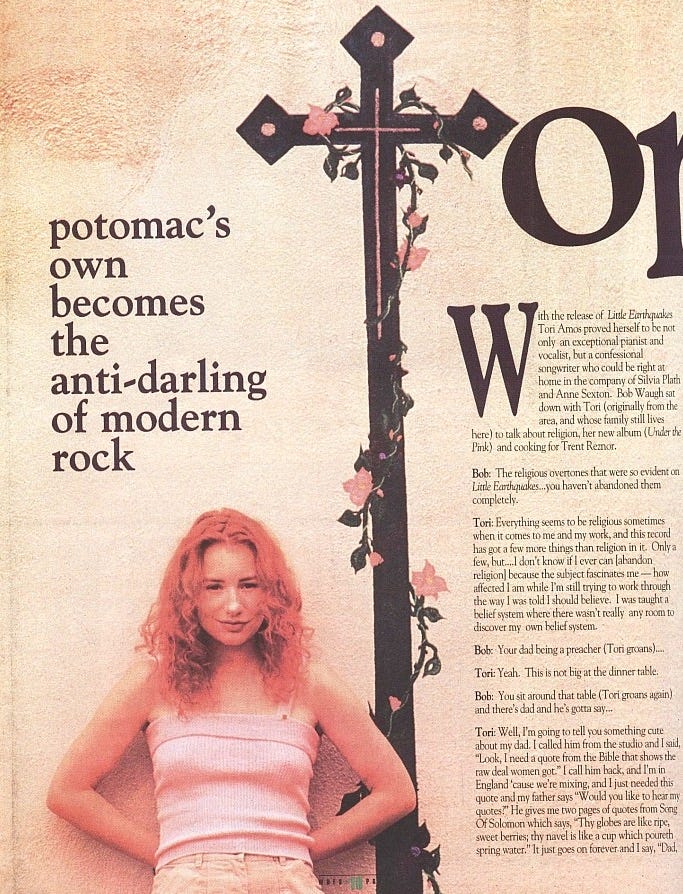There’s an entire genre of music from the 90’s that I like to call “lesbian rock for straight chicks.” I also call it Hairy Armpit Music. The jewel in this feminine crown is undoubtedly Tori Amos, daughter of a Methodist minister yet oddly an adherent of a kind of fairie faith. “I really really love Christ, but I’m not a Christian,” she once said. Despite her protestations and her place in the pantheon of secular female artists of a certain era such as Paula Cole and Ani DiFranco, many of Tori’s songs express a distinctly Christian pathos. “I've been looking for a savior in these dirty streets / Looking for a savior beneath these dirty sheets,” she sings in 1992’s “Crucify.” A patron saint of queer kids (yes, I said the q-word, deal with it) from fundamentalist backgrounds who forsook the faith, questioned everything, and became Wiccans, Tori’s embrace of the supernatural and otherworldly was a healing balm.
“I do have a mission,” she told Rolling Stone in 1998, “to expose the dark side of Christianity.” Rather than repugnance, however, the listener finds in that dark side a kind of allure. Amos famously wrote about touching herself in her family’s house while people below held religious meetings: “When they say take of his body / I think I'll take from mine instead … While they’re all downstairs / Singing prayers … Feel the word / Feel it.” Instead of rejecting the faith, she seemed to develop a female interpretation of it. In a 1994 interview she stated that Christ “came from Heaven and we, as women, come from the Earth.” Amos presents a vision of Christian womanhood as fully sexual. She is more artist than nun, more Magdalene than Virgin Mary.
“Christianity and feminism are similar words to me,” she said, explaining at one point why she couldn’t fully embrace either term. One gets the idea that her reluctance to assent to either value system exists in service to her creative vocation and freedom of expression at all costs. Still, Amos knows who she is. “I'm a daughter of the Christian church,” she stated in 2005, settling the matter.
A grrrl rather than a womyn, Hayley Williams (another redhead) started her career in Paramore as an earnest Evangelical. Indeed, Paramore was a Christian band, and the mainstream emo explosion’s aughts-era connection to nondenominational, bleeding-heart Christianity has not been fully explored (in case you never thought there was a link between the gospel and Vans Slip-Ons/the Warped Tour, think again).
In “My Heart,” the last song from 2005’s release “All We Know Is Falling,” Williams addresses the Divine: “I am finding out that maybe I was wrong / That I've fallen down and I can't do this alone.” Her conclusion resembles the monastic mandate to prefer nothing to Christ: “This heart, it beats / Beats for only you / My heart is yours.”
More screamo than emo, Flyleaf is another band that originated in the 2000s and brought a kind of charismatic fervor to lyrics that could be heard in any mall. “My arms are outstretched towards you … / Burning,” frontwoman Lacey sings to God in “All Around Me.” She continues: “My hands float up above me / And you whisper you love me / And I begin to fade / Into our secret place.” Is she describing a personal experience? A Pentecostal church service in the Bible Belt? Or something akin to what St. John of the Cross wrote about in “The Dark Night of the Soul:” “On that glad night / In secret … I abandoned and forgot myself / Laying my face on my Beloved /
All things ceased; I went out from myself.”
Flyleaf was a touchstone for kids from dysfunctional households who needed to believe in something bigger. “I’m so sick, infected with where I live,” Lacey sings. She went on to collaborate with everyone from Hot Topic to the Billy Graham Evangelistic Association.
Ok. So I know a lot of people can’t stand him and he’s a big fat neolib and stuff. And he’s not a woman and definitely not a womyn. But I unabashedly love Bono. Look at him. This picture is hawt. And as long as I’m exploring pop culture figures who are also hardcore Christians, I have to include the U2 frontman. 80’s Bono is undeniable. He seems to be in this odd tribe of People Who Look Like Elves and are Crazy for Christ (Tori, myself, etc.). I wonder if there’s a connection between people who are naturally pagan souls but can’t help but acknowledge that Jesus is Lord. In “Walk On: The Spiritual Journey of U2,” Steve Stockman writes about U2’s early involvement with a radical group named Shalom. Described as “charismatic,” “enflamed,” and a “gang,” Shalom was a collective which the musicians discovered as teenagers. It led them to question whether they should continue in their artistic mission or whether such activity was contrary to total devotion to God. “It is little wonder that their souls were in turmoil as they attempted to untangle their future,” Stockman writes. “The miracle is probably that they came out of it and decided to go on.”
One doesn’t have to look far to find denunciations of Christianity as an inherently anti-female religion. And each feminist who proclaims this platitude, chest puffing with pride as if she is pronouncing something incisive and renegade for the first time, seemingly has no idea that her statement is as stale as chewed gum on the sidewalk. In “When God Was a Woman,” author Merlin Stone moans about “the suppression of women’s rites” under Judeo-Christian “values and moralities.” Her claims are hollow for me. Christianity is my salvation and my embrace of Christ is profoundly female. Men have always been the peacemakers in my life. Mary Magdalene is the one who finds Christ on Easter morning, who recognizes His voice as He speaks to her. It is impossible for me to regard a religion as oppressively patriarchal that presents its resurrected deity first and foremost to a woman.









